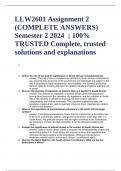LLW2601 Assignment 2
(COMPLETE ANSWERS)
Semester 2 2024 ; 100%
TRUSTED Complete, trusted
solutions and explanations
1.
2. Define the rule of law and its significance in South African constitutional law.
○ Answer: The rule of law is a fundamental principle in South African constitutional
law, ensuring that all actions of the government and individuals are subject to the
law. It emphasizes legal transparency, accountability, and fairness, protecting
citizens' rights by ensuring that laws are applied equally and without arbitrary use
of power.
3. Discuss the doctrine of separation of powers. How is it applied in South Africa?
○ Answer: The doctrine of separation of powers divides governmental powers
among three branches: the executive, the legislature, and the judiciary. In South
Africa, this doctrine is upheld by ensuring that each branch operates
independently and without overreach. The executive implements laws, the
legislature creates them, and the judiciary interprets them, maintaining a system
of checks and balances.
4. What is the importance of constitutional supremacy in the South African legal
system?
○ Answer: Constitutional supremacy means that the Constitution is the highest law
of the land, and all laws, policies, and government actions must align with it. In
South Africa, this principle ensures that the rights enshrined in the Constitution
are protected, and any law that contradicts it can be declared invalid by the
courts.
5. Explain the significance of judicial review in the context of South African law.
○ Answer: Judicial review allows courts to evaluate the constitutionality of laws and
government actions. In South Africa, this process ensures that legislation and
executive decisions adhere to the Constitution, offering a mechanism to
challenge unlawful actions and protect citizens' constitutional rights.
6. Discuss the Bill of Rights in the South African Constitution. What are the key
protections it offers?
, ○ Answer: The Bill of Rights in the South African Constitution is a cornerstone of
democracy, protecting fundamental rights such as equality, dignity, freedom of
expression, and the right to life. It ensures that the government and individuals
respect these rights, and it offers legal avenues for redress if they are violated.
What is constitutional democracy? How does it differ from other forms of democracy?
○ Answer: Constitutional democracy is a system where the government's power is
derived from and limited by a constitution. Unlike direct or majoritarian
democracy, it ensures that the rights of individuals are protected, even against
majority rule, through constitutional safeguards.
2. Explain the relationship between constitutionalism and the rule of law.
○ Answer: Constitutionalism is the principle that government authority derives from
and is limited by a body of fundamental law (the constitution). The rule of law
ensures that laws govern the nation, applying equally to all, ensuring that no one,
including the government, is above the law.
3. Discuss the role of the judiciary in safeguarding constitutional democracy in
South Africa.
○ Answer: The judiciary interprets and applies the Constitution, ensuring that the
laws and actions of the government conform to constitutional principles. It acts as
a check on the powers of the executive and legislature, protecting citizens’ rights
through judicial review.
4. What is the role of the Constitutional Court in South Africa?
○ Answer: The Constitutional Court is the highest court in South Africa regarding
constitutional matters. It has the authority to interpret, protect, and enforce the
Constitution, including ensuring that laws and actions are consistent with
constitutional principles.
5. Outline the process of amending the South African Constitution.
○ Answer: Amendments require varying degrees of parliamentary approval. For
most provisions, a two-thirds majority in the National Assembly and a supporting
vote of at least six provinces in the National Council of Provinces is needed.
Some changes, like amendments to the Bill of Rights, require more stringent
processes.
6. What are the principles of equality and non-discrimination in the South African
Constitution?
○ Answer: Section 9 of the Constitution enshrines equality before the law and
prohibits discrimination on grounds such as race, gender, religion, and more. It
also allows affirmative action measures to promote the advancement of
disadvantaged groups.
7. Explain the right to freedom of expression as provided in the South African
Constitution.
○ Answer: Section 16 guarantees freedom of expression but places limits on hate
speech, incitement to violence, and propaganda for war. This ensures a balance
between free speech and protecting others from harm.
8. Discuss the limitations of constitutional rights as outlined in Section 36.
○ Answer: Rights in the Constitution may be limited if the limitation is reasonable
and justifiable in an open and democratic society, considering factors such as the
nature of the right, the importance of the limitation, and whether less restrictive
means are available.
9. What is the significance of socio-economic rights in the South African
Constitution?




